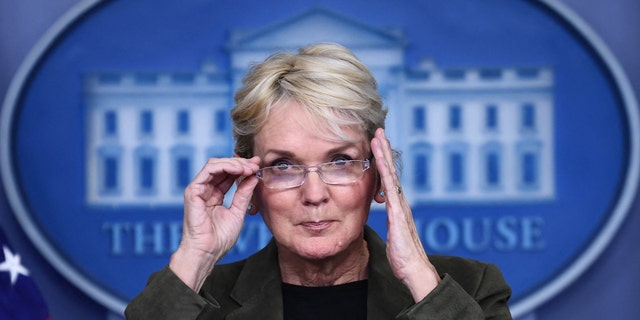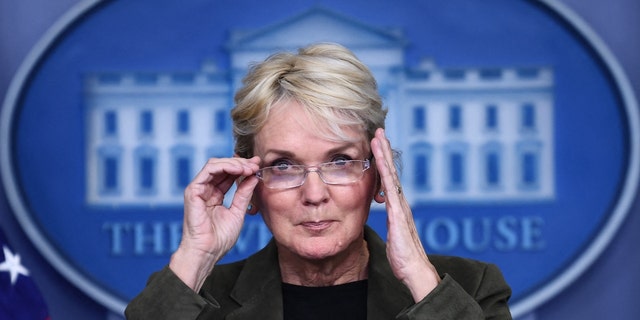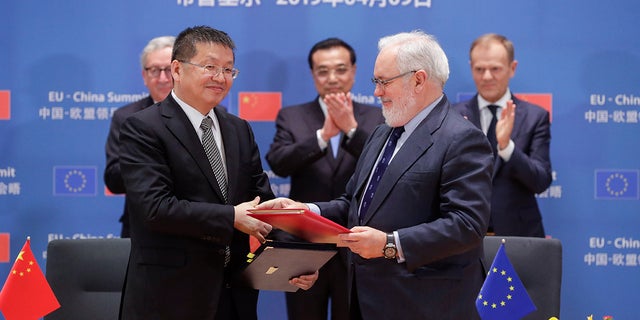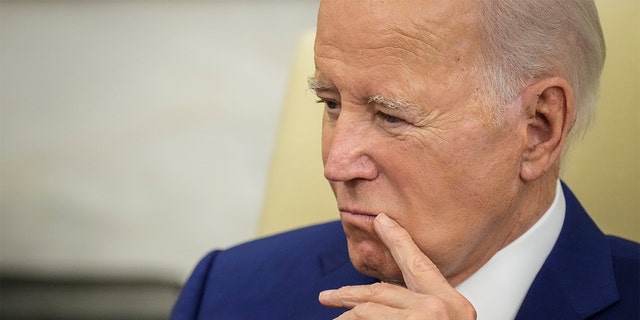
EXCLUSIVE: Energy Secretary Jennifer Granholm engaged in multiple conversations with the Chinese government’s top energy official days before the Biden administration announced it would tap the Strategic Petroleum Reserve (SPR) to combat high gas prices in 2021.
Granholm’s previously-undisclosed talks with China National Energy Administration Chairman Zhang Jianhua — revealed in internal Energy Department calendars obtained by Americans for Public Trust (APT) and shared with Fox News Digital — reveal that the Biden administration likely discussed its plans to release oil from the SPR with China before its public announcement.
According to the calendars, Granholm spoke in one-on-one conversations with Jianhua, who is a longstanding senior member of the Chinese Communist Party, on Nov. 19, 2021, and two days later on Nov. 21, 2021. Then, on Nov. 23, 2021, the White House announced a release of 50 million barrels of oil from the SPR, the largest release of its kind in U.S. history at the time.
“Secretary Granholm’s multiple closed-door meetings with a CCP-connected energy official raise serious questions about the level of Chinese influence on the Biden administration’s energy agenda,” APT Executive Director Caitlin Sutherland told Fox News Digital.
“Instead of focusing on creating real energy independence for America, Granholm has been too busy parroting Chinese energy propaganda and insisting ‘we can all learn from what China is doing,’” Sutherland continued. “The public deserves to know the extent to which Chinese officials are attempting to infiltrate U.S. energy policy and security.”
REPUBLICANS URGE INVESTIGATION INTO BIDEN’S ‘MISMANAGEMENT’ OF EMERGENCY OIL STOCKS

Energy Secretary Jennifer Granholm speaks about the Biden administration’s decision to tap the Strategic Petroleum Reserve during a press briefing at the White House on Nov. 23, 2021. ((Photo by Brendan Smialowski / AFP) (Photo by BRENDAN SMIALOWSKI/AFP via Getty Images))
In a statement, the DOE said the meeting was broadly part of the agency’s effort to combat climate change, but didn’t share what was discussed at the meeting.
“Solving the climate crisis means engaging with competitors and allies in clear and substantive discussions — especially among the nations emitting the most carbon pollution into the atmosphere,” a DOE spokesperson told Fox News Digital. “We must all address the transnational challenge of climate change to our planet.”
As part of its announcement in November 2021, the White House said it was releasing oil from U.S. reserves in conjunction with “other major energy consuming nations including China.” However, President Biden said in remarks after the announcement that China “may do more as well” and Granholm told reporters during a press briefing that China “will make its own announcement.”

Chinese Minister of Energy Zhang Jianhua and European Climate Commissioner Miguel Arias Canete shake hands at a EU-China summit in Brussels on April 9, 2019. (STEPHANIE LECOCQ/AFP via Getty Images)
Republican leaders have warned that China, instead of releasing oil stocks, has increased its own reserves since Biden and Granholm’s announcement in November 2021. They have argued the SPR releases weakened U.S. national security and bolstered foreign adversaries’ “geopolitical leverage.”
REPUBLICANS’ SPR BILL LEAVES DEMOCRATS SQUIRMING OVER OIL LEASING: ‘IT’S THE PROCESS OF BALANCE’
“China ramped up its purchases of crude oil from Russia and the United States to boost its own reserves, even as oil prices surged and President Biden called for a coordinated release,” House Energy and Commerce Chair Cathy McMorris Rodgers, R-Wash., and former GOP Rep. Fred Upton wrote to Granholm last year.
“As a result, China may now control the world’s largest stockpile of oil, with total crude inventories estimated at 950 million barrels,” they added.
In addition, the White House and Department of Energy has been heavily criticized for allowing SPR sales to flow to Chinese state-run energy companies. The White House then fired back in July 2022, arguing that its hands were tied since it is legally required to sell SPR oil to the highest bidder.

Under President Biden, the Strategic Petroleum Reserve has fallen to 346.8 million barrels of oil, its lowest level since August 1983, according to federal data. (Drew Angerer/Getty Images)
The administration has sold at least two million barrels of oil from the SPR to Unipec, an affiliate of the state-controlled China Petrochemical Corporation. Jianhua, who met with Granholm in 2021, served in a leadership role for years at the China Petrochemical Corporation, Reuters previously reported.
The first such sale was part of a 20-million-barrel SPR sale awarded to eight companies in September 2021. The other two — both sales for 950,000 barrels of oil — came in April 2022 and July 2022, respectively.
CLICK HERE TO GET THE FOX NEWS APP
“China is profiting from President Biden’s political abuse of the Strategic Petroleum Reserve,” Senate Energy and Natural Resources Committee Ranking member John Barrasso, R-Wyo., said earlier this year. “Meanwhile, America has become more vulnerable to true energy and national security emergencies.”
Overall, Biden has ordered the Department of Energy to release a total of about 260 million barrels of oil stored in the SPR since taking office to combat record fuel prices hitting American consumers. In late March 2022, the president announced a draw-down of a million barrels per day from the SPR after Russia invaded Ukraine, roiling global energy markets.
The SPR’s level has fallen to about 346.8 million barrels of oil, the lowest level since August 1983, according to Energy Information Administration data released on July 28. The current level is also 43% lower than its level recorded days prior to the November 2021 release.






